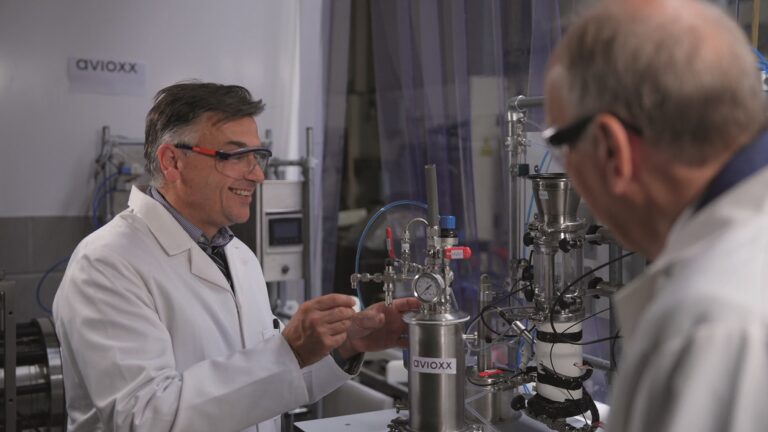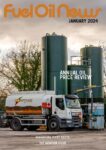
An exciting development
Avioxx is aiming to be a leading technology provider for sustainable aviation fuel, produced from waste materials, to enable net zero emissions for air travel. The company has developed a patented process to transform low-cost waste hydrocarbons into jet fuel.
Chris explained more about this exciting development: “The process uses solid oxide fuel cells, some of the most advanced in the world, to allow us to convert the waste into fuel much more efficiently than the competition.
“So much so, that we are comfortable committing to providing the fuel at the same price as fossil-based kerosene. You can read more about the process here: https://www.avioxx.co.uk/heres-the-science-how-we-make-fuel-from-waste.html
“It’s all about how we break down the waste into its basic molecular components using a gasification process with pure oxygen and generating our own electricity to power the process.”
The market
Chris shared his thoughts on the current SAF market: “The market has got immense demand, driven by shareholders, governments, and customers,” he said. “Current solutions are non-scalable due to limited availability of feedstock or the cost of processes, many of which have an extremely high energy demand resulting in extremely high costs.
“Another key factor is the measurable emissions reduction. Different processes will prevent different amounts of CO2 from being released.
“Avioxx fuel will prevent a significant amount of CO2 from being released, primarily by eliminating the need to burn fossil-based fuel as well as diverting waste from incineration. That is why, with this fuel, net-zero flights are much closer than you think.”
The journey to Avioxx
Chris shared more about his own background and how Avioxx came about. “I started out in tech, building online platforms for some of the most famous brands. Over the last decade, I’ve built and exited two award-winning FinTech companies which have gone through M&A.
“The key challenges here were the regulatory aspects of the platform and the need to ensure the businesses are FCA compliant. £50m in capital was raised for small and medium sized UK businesses and I will be applying a venture building approach to the company which will operate in a highly agile and dynamic way. Responsible disruption can deliver impressive results for sectors that may be undergoing change.
“I also have a degree in Environmental Engineering that I have always wanted to use, and I am mega excited about sustainable aviation fuel – it feels like the start of the FinTech movement 10 years ago, but 10 times the size, importance, and opportunity. I also have experience of working directly with companies like Virgin, The Coca-Cola Company, and HSBC Private Bank.”
Business foundations
Chris explained how, along with his co-founders, the decision was made to start the business: “Dr Stephen Wilkinson was a family friend for 10 years, lives locally and has decades of experience in chemical engineering. He is from a family of chemical engineers and is probably one of the most experienced engineers the UK has in this field. He is absolutely brilliant!
“Along with our third co-founder, Dr Michael Hancock, we noted, back in January, the surging demand for SAF and saw the opportunity to commercialise Dr Hancock’s patented system. This opportunity really came at the right time – both Steve and I were looking for new projects to take on, so it was almost a no-brainer to start Avioxx together.
“Joining the three founders, Mike, Steve, and myself, we also have one permanent founding team member, Emily, and we have a fantastic founding team dynamic. We are also supported by our Web Developer, Anthony, and our Head of Feedstock, Will.
“Everyone is extremely passionate about sustainability and brings a diverse skillset to the team. Our company culture is paramount to get right, and everyone is really focused on delivering our first batch of fuel for clients. This is a real opportunity to reduce a huge amount of CO2 emissions and clean up the environment at the same time.”
The ambition
“We will have Avioxx fuel by January 2024 to allow us to commence the testing and licensing process. Avioxx has the potential to become the global standard with its novel process.
“We are targeting 1m tonnes of SAF by 2030, which is enough to meet the UK government target of a 10% SAF blend by 2030. To accomplish this, we have ambitious goals to build multiple plants, starting in the UK then expanding globally.
“We are already speaking with five major global airlines and discussing offtake agreements of 1000 tonnes each. By the end of Q1 2024 we will have already pre-sold our first year’s supply of the fuel. We are also targeting some well-known prestigious clients and private jet owners, so we are really selling to a wide customer-base across the world.”
Chris is clearly ambitious, and Claudia asked him where he sees the business in 10 years’ time: “In 10 years, we want Avioxx to be the global standard for SAF,” he answers. “We want to produce the best aviation fuel globally and be leaders in sustainable fuel development.
“We want to be able to use an amazing range of feedstocks, like ocean plastics and textiles, to make our fuels. We would have a research and development roadmap for the advancement of technology to offer even further reductions to aircraft emissions – even leading to things we may not have thought of yet.”
Feedstocks
The provenance of feedstocks for biofuel is a key issue and something that Chris wanted to highlight: “The biofuel market faces challenges, such as limited agricultural land for feedstocks, and emissions calculations that are highly complex, with many considerations to account for.
“Addressing concerns over potential rainforest destruction and prioritising sustainable practices, businesses have got to explore advanced technologies to ensure responsible biofuel production that doesn’t compromise other environmental aspects. Collaboration between regulatory bodies and airlines is paramount, ensuring that the ‘S’ in SAF is top priority.”
What will make the difference to mass adoption of biofuels?
“Getting biofuels to be widely adopted involves several key factors. First, these biofuels need to be priced right, at a rate that is competitive to the fuels we’re used to.
“Then, there’s the regulatory aspect of it. Governments play a central role in shaping the energy landscape, and policies that incentivise or mandate the use of biofuels could have a significant impact on biofuel adoption.
“We have got to get people on board as well. We need consumers and shareholders to be aware of green options and demand that airlines provide alternatives to fossil-based kerosene. And, of course, the technology must be developed to make the fuels at-scale and at low cost.”
The world is waking up to the need for SAF
Claudia asked Chris about the future of the industry and what he felt would be the challenges and positives of the next few years. “Currently, there is not much focus on distribution of SAF and the process is quite opaque so far,” he suggests. “Much of the support from regulators and government bodies revolves around production and licensing, but with little discussion about how we can get the fuel to airports or customers.
“As mentioned before, sourcing feedstock is going to be a challenge and, in our case, management of various waste streams and processing it for fuel production instead of incineration is a challenge we will have to solve.
“The positive is that the world is really waking up to the need for SAF, and there are a lot of programs kicking off worldwide to help ramp up production.”
Chris considers the best piece of advice he has been given since joining this industry: “Industry experts have told us that the economics and price are the most important when it comes to SAF. We have the process and the solution to make the fuel cost competitive, so this gives us lots of confidence that we have a market edge!”
A positive environmental contribution
Finally, Claudia wanted to know what Chris enjoys most about operating in the future fuels sector. “We all love to travel, so it is very fulfilling to be an enabler to allow continued access to global flights without damaging the planet or having consumers front the extra cost of sustainable flights.
“Physical interconnectedness and international experiences are crucial for society.
“What makes being in this sector even better is the ability to contribute positively to the environment while doing so. The prospect of being part of this new, environmentally conscious approach is genuinely exciting. I am also new to this field, so learning and diving into something completely new for me adds another level of excitement.”
Fuel Oil News wishes Chris and the Avioxx team all the best for an exciting 2024 and look forward to catching up again in the future to hear about their progress and developments.


